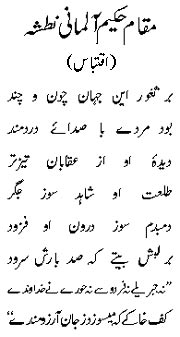
Search the Republic of Rumi
|
Chapter 77
Nietzsche and Sharfunisa
On the outer boundary of this world stands a madman. On his lips are the eternally recurring lines, “No Gabriel, no Paradise, no houri, no God: Only a handful of dust consumed by a yearning soul!”
This is the German thinker Nietzsche. His place is between the two worlds but he stops short of crossing over into the realm where speech sprouts without spoken words.
A world appears that has no dimensions. The light of perception dims here and words die in awe of meaning. “To speak of the soul with the tongue is like trying to fly high in a cage,” the Poet observes. “But this station is compatible with the heart.” Here vision becomes superior to perception and hence this world defies the way perception is normally understood.
In terms of analogies, it may be said that there is light, presence and life. Tulips repose amidst mountains. Rivers meander in gardens. Crimson, white and blue buds blossom with the breath of the angels. Silver waters, ambergris air, palaces with domes of emerald, tents of ruby with golden ropes and beauties with countenances radiant as mirrors are to be seen everywhere.
“Prisoner of analogies, transcend the credibility of the senses,” says Rumi. “These palaces are built of deeds and not of bricks and stones.”
The Palace of Sharfunisa
There is an edifice of pure ruby whose portico is thronged by the houris. This is the mansion of Sharfunisa.
She was a noble maiden from Punjab who used to keep a sword by her side when reading the Quran. She left instructions that the two should be placed on her grave when she dies. “The word of truth and the power to protect it,” says Rumi.
Iqbal’s ancestors came from Kashmir but he was born in Punjab and has been living there. He begins to feel homesick when Rumi asks him to observe what is now coming and not give his heart to what has passed.
 |
You have reached the end of this chapter. You may like to discuss it before reading the next.
|

Search the Republic of Rumi
|
As Rumi and Iqbal move “beyond the skies”, philosopher Nietzsche appears to be stranded on the border while a woman from Punjab who desired to combine truth with power has got a palace in Paradise.


 Special
thanks to
Special
thanks to